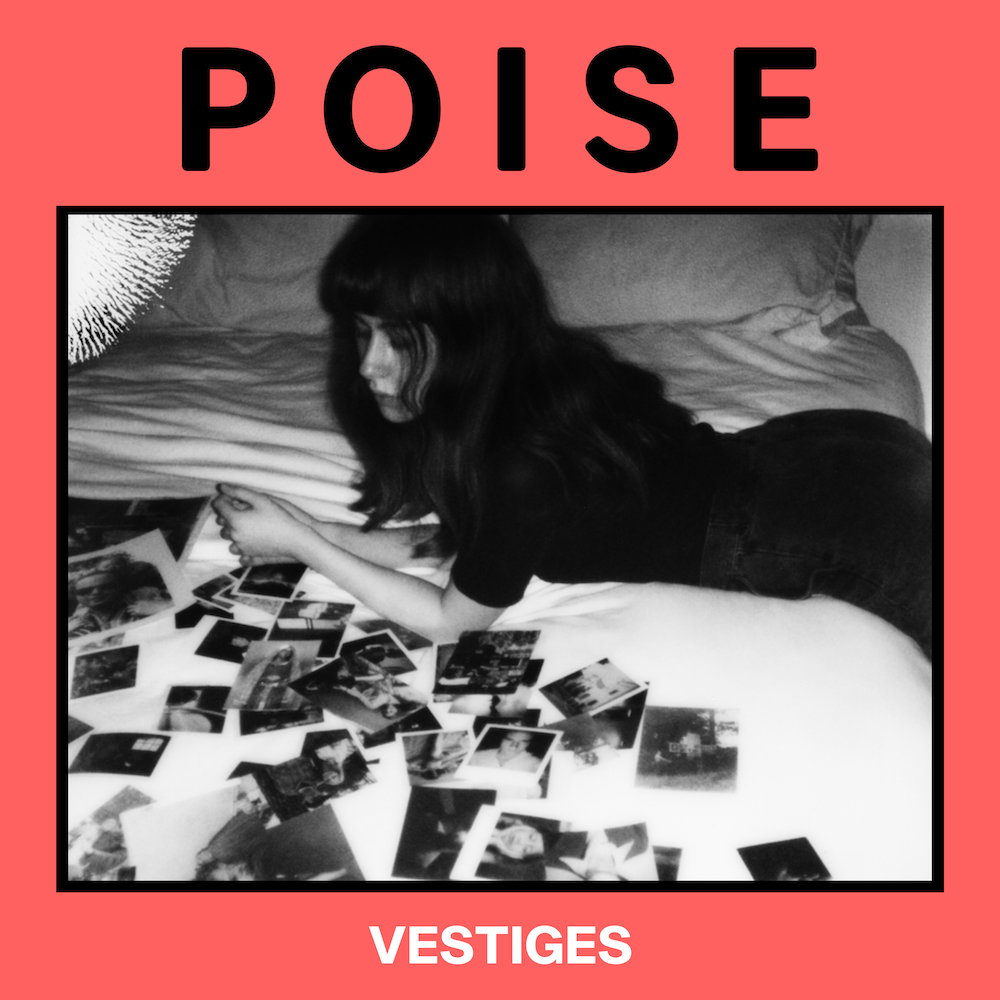When Lucie Murphy snarls “I’m gonna show you / What I can do” on “Walked Through Fire”, the opening track to her debut album Vestiges, it’s as much a threat as it is a promise. Under her moniker Poise, Murphy uses her debut to process a long year and charge forward. After unexpectedly losing her father and having her first tour cancelled because of the pandemic, her creative spirit was low and full of doubt. Escaping from her place in Brooklyn to a cabin in Vermont, she took strides forward, channeling her grief and sorrow into an impassioned album that captures and reckons with her pain head on. When she says she’s going to show us what she can do, it’s a mantra of self-belief to herself and the surrounding world.
Murphy’s setup is simple but enormously effective on Vestiges. Her guitar is as much a voice of anguish as her singing is, as evidence on “Walked Through Fire” where creaky, semi-distorted lurches form a sort of mangled scaffolding around her words. On “New Kind of Love”, the electrified strings emulate her multi-tracked coo during the solo, a brush of a sneer with every note. Elsewhere, when Murphy reigns in the noise and aims for a gentler sentiment like on the title track, her instrument is soft and almost cloud-like. Some brushed drums from percussionist Theo Munger help sweep the track along peacefully.
Vestiges will bring to mind PJ Harvey, Angel Olsen, Sharon Van Etten for many listeners, but Murphy never feels like a simple emulation of her peers. Rather, she takes a swirl of elements from each, but punctuates it all with her own personal despair. Whether she’s explosive like on the one-two punch of “Nothing I Can Say” and “Everything I Want”, or slow burning like on the smouldering “Vessel”, her sincerity and emotional agony are never in doubt.
Her lyrics are forthright and all the more impacting for this: “You can’t just say you love / You’ve got to show me your love,” she leads on “Show Me Your Love”, before later adding “I really don’t fuck around, man.” On the stark and bare final track “I’m Not” Murphy asks “Can I will myself into the shape of something good for you?”, her voice doused in reverb like she’s singing from a distant, candle-lit room. “I tried to be what you wanted / But I’m not,” she concludes, repeating those last two words over and over until the end, like she’s gradually realising the full implications of what she’s saying. She’s let someone down, but maybe that’s not a bad thing in this instance.
The album hits hardest when Murphy is reckoning with her grief and sadness though. “I can’t pretend I’m happy / when I’m simply not,” she sings on the sweetly-tinged but downcast “Forgive”. “I’m already made of everything I want / Don’t think I can bear any more rotten luck,” she pleads quietly on “Everything I Want”, before the track builds and snaps into place, the beat and guitars swinging into a thrilling full rock-out moment. Moments like this remind the listener that grief comes in many forms, from dispirited moments to bursts of anger and fury. At times Murphy sounds pissed at the world, like it has wronged her specifically, but equally it all circles back to her trying to process a great loss in her life. (Her father inspired her to take up guitar, and introduced her to a slew of different kinds of music.)
This is how Vestiges does as it says on the tin: captures remnants of memories before they vanish and brands them into the history books through fiery songs. “I will live the biggest life for you / So no one can ever forget you,” she promises on the album’s title track. She elaborates on “Vessel”, asking “How can I hold your memory with the most gentle care?” while drummer Theo Munger harmonizes alongside her like the ghost of her father. There might be no solid answer to her question, but Vestiges feels like a strong first step into figuring it out.

